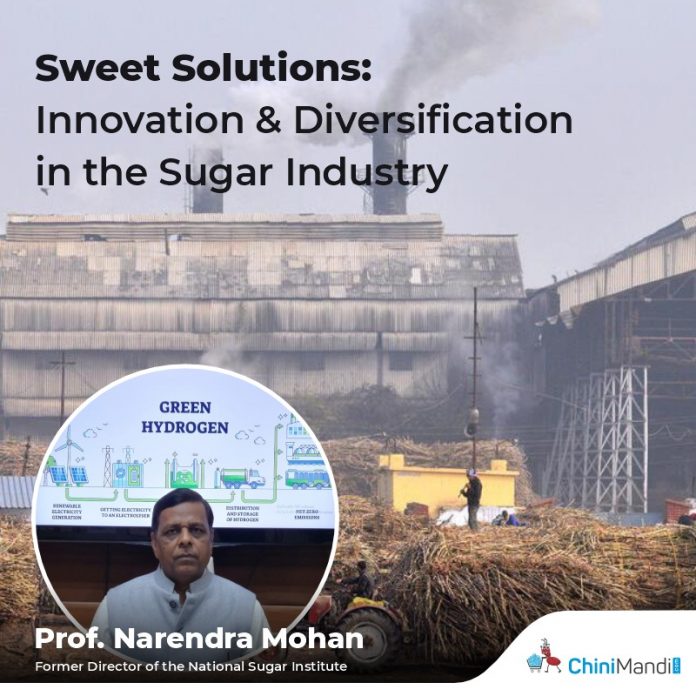With an objective to reduce the carbon emissions, restrict rise in the earth temperature and mitigate the issue of climate change, green hydrogen is being considered as the future fuel. The issues of global warming and climate can be taken care to a larger extent by restricting the use of conventional fossil fuels and going in for fuels which are cleaner, green and renewable. Already into production of clean & green energy i.e. power, ethanol and compressed bagasse, in times to come sugar industry may be at the forefront for producing green hydrogen as well, said Prof. Narendra Mohan, Former Director, National Sugar Institute, Kanpur.
Across the globe there is continuous and serious brainstorming on the environmental issues and government of various countries are now in the process of exploring potential of non -conventional energy resources or the fuels which result in generation of clean and green energy. India has also taken a lead in this direction and we have seen a surge in solar and wind power generation during the last decade or so along with biomass based energy production. Indian sugar industry has already taken a lead by developing clean and green energy by contributing bagasse-based electricity, juice & molasses based ethanol for EBP and compressed biogas or bio-methane produced from filter cake as automotive or fuel for other purposes, said Prof. Mohan.
Various countries have set targets to achieve net zero emissions by 2040 to 2070. Green hydrogen is being looked into as a potential source which can play a significant role in this commitment as it can serve as a clean and sustainable energy carrier. India has set its sight on becoming energy independent by 2047 and achieving Net Zero Carbon Emissions by 2070. The National Green Hydrogen Mission was approved by the Union Cabinet on 4 January 2022. The mission outcomes projected by 2030 are:
- Development of green hydrogen production capacity of at least 6 MMT (Million Metric Tonne) per annum with an associated renewable energy capacity addition of about 125 GW in the country
- Over Rs. Eight lakh crore in total investments
- Creation of over Six lakh jobs
- Cumulative reduction in fossil fuel imports over Rs. One lakh crore
- Abatement of nearly 50 MMT of annual greenhouse gas emissions.
India aims to revolutionise its energy landscape by producing 6 million tonnes of green hydrogen annually from 2030 onwards. This ambitious pursuit aligns with India’s domestic consumption figures, with a further aspiration to scale production to an impressive 10 million tonnes.
POSSIBLE PRODUCTION OF GREEN HYDROGEN IN SUGAR INDUSTRY
Sugar Industry since produces biomass based clean, green and renewable energy and also the filter cake (press mud), both the routes for production of green hydrogen may be considered as shown in the figure. The bio-electricity may either be used for electrolysis or may be used in catalytic conversion of biogas (methane pyrolysis) produced from filter cake to green hydrogen and carbon black. Green hydrogen production through methane pyrolysis, also known as methane cracking or thermolysis, is a promising technology with the potential to reduce greenhouse gas emissions compared to conventional hydrogen production methods.
 Possible routes for production of Green Hydrogen in sugar industry
Possible routes for production of Green Hydrogen in sugar industry
Evaluation of issues involved in production of green hydrogen through these two routes viz. cost, energy efficiency, infrastructure, safety concerns, carbon footprints and sourcing of raw material etc. is required to be meticulously done as each process has its own set of challenges and considerations. As I said, challenges in production of green hydrogen, particularly with respect to cost and competiveness shall have to be addressed to maximize potential of green hydrogen and ensuring its role in a sustainable and low-carbon future. Collaboration among governments, industries, and researchers is crucial for overcoming these obstacles.
Sugar industry is likely to play a role in producing this future fuel at an affordable cost looking to cheap source of production of clean and renewable energy but we are required to have dedicated discussions on this aspect for formulating a strategy said Prof. Narendra Mohan.












